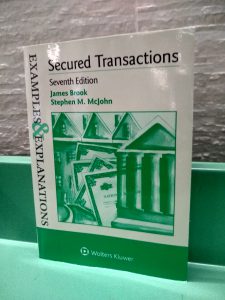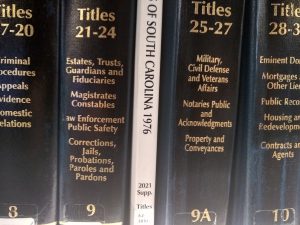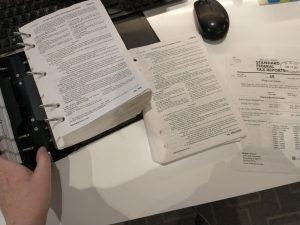by guest author Melanie Griffin
The new semester is coming up fast, and the circulation desk is here to make sure you have access to all the most current materials you need to start strong. Let’s take a look at how your law library keeps up with the times.
Many physical law volumes are updated by a process called filing. That’s when we switch old material for new to make sure everything stays up to date. Here’s how that works:
 Replace old volumes with new ones. This is the simplest form of filing. When a new version of a law book is published, the library’s Technical Services office orders the new volume, puts it in our catalog system, and sends it down to Circulation, where we put it on the shelf. The older volume gets placed in another location.
Replace old volumes with new ones. This is the simplest form of filing. When a new version of a law book is published, the library’s Technical Services office orders the new volume, puts it in our catalog system, and sends it down to Circulation, where we put it on the shelf. The older volume gets placed in another location.
For example, when we received the seventh edition of the Secured Transactions Examples & Explanations study aid, that edition went into the Reserve Room, and the sixth edition was put into the general stacks.
 Update pocket parts. Many of the multi-volume sets in the law library contain information that updates too quickly to put out entire new books, so instead small paperback additions are tucked into the books’ back covers. These additions are called pocket parts, and they are changed out when new updates are required so that the volumes are always current as a full set.
Update pocket parts. Many of the multi-volume sets in the law library contain information that updates too quickly to put out entire new books, so instead small paperback additions are tucked into the books’ back covers. These additions are called pocket parts, and they are changed out when new updates are required so that the volumes are always current as a full set.
For example, we receive yearly pocket part updates for the Code of Laws of South Carolina to make sure those stay current with legislation.
 File loose-leaf updates. Some physical materials need more direct and precise updating, and those are housed in loose-leaf binders with hole-punched pages. That way, whatever pages that are out of date can be removed and replaced by new ones, which are sent in bundled updates. These can range from less than a dozen to several hundred at a time, making loose-leaf updates the most varied of our filing process.
File loose-leaf updates. Some physical materials need more direct and precise updating, and those are housed in loose-leaf binders with hole-punched pages. That way, whatever pages that are out of date can be removed and replaced by new ones, which are sent in bundled updates. These can range from less than a dozen to several hundred at a time, making loose-leaf updates the most varied of our filing process.
For example, the Standard Federal Tax Reporter series gets a loose-leaf update every week because tax law changes frequently. That’s our update process for physical materials in the law library. Let us know if you need anything — we’re here to help!